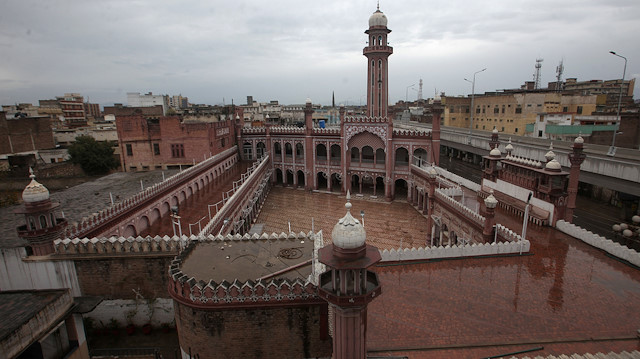
Millions of Muslims across South Asia stay home as authorities ban congregational prayers amid coronavirus pandemic
Millions of Muslims across South East Asia stay at home on Friday following bans and repeated calls to suspend Friday congregational prayers as part of efforts to stem the spread of the novel coronavirus known as COVID-19.
Several cities in Indonesia, the largest Muslim nation with over 270 million population, have suspended religious gatherings for two weeks as country is under lockdown.
The Indonesia Ulema Council said mass Friday prayers remain mandatory for those in areas with low potential for spread of the virus.
But Muslims are not allowed to perform Friday prayers at the mosque in places where the virus has spread "uncontrollably".
Malaysia had also banned Friday prayers last week and mosques across the country follow the direction for the second time today.
In Pakistan, people partially followed a ban on Friday prayers across the country, as people in remote areas did not heed to the call for staying away from typical Friday congregations.
In major cities, including the capital Islamabad, commercial capital Karachi, Lahore, Peshawar and Quetta, attendance at mosques was much lesser than regular times, according to local media.
Faysal Mosque, the country largest mosque in Islamabad remained closed for general public for Friday prayer.
- No Friday prayers in Kashmir
The Friday congregational prayers in the Indian-administered Kashmir were also suspended after the region reported one death and 13 cases, including an 8-month-old baby.
Most people in the region did not move out of their homes for prayers on Friday after early announcements from local mosques cautioned people not to come for the prayers.
The region's Grand Mufti Nasir-ul-Islam told Anadolu Agency that after taking expert opinion from health specialists, scholars and other experts, it has become imperative to call off the prayers from the mosques and shrines in view of the pandemic.
“People can pray at home when our religion allows it, there is no need to go to mosques till the situation gets normal,” he said.
Also the government spokesman in the region, Rohit Kansal today tweeted that all district commissioners and police officers in the region have been strictly asked to caution religious leaders not to call any gatherings.
This is the first time that the Friday congregational prayers have been suspended across the region and the decision was taken after the region reported its first death on Thursday.
The decision was taken on board with different socio-religious organizations, one of the members of Jamia Masjid Committee, in the main city of the region, Srinagar confirmed to Anadolu Agency.
The administration on Thursday in the region has also ordered closure of all religious institutions, including gurudwaras, shrines and mosques, and appealed to the management committees of all places of worship and all residents of the region to cooperate and support.
The first case to be reported in the region was on March 18 after which the religious clergy had suggested that the elderly and sick should remain home and not come out for the Friday prayers.
As of now, 10 people have tested positive for the virus in the Kashmir region, while three have been reported from Jammu region earlier this month taking the tally to 13. Over 5,000 patients have been put under observation, while one has died, another recovered so far.
- 'I have never seen such a situation in my life'
Amid lockdown to contain the spread of coronavirus, people in India on Friday offered prayers at their home. This comes after clerics across the nation had issued statements on Thursday asking people not to gather in mosques to offer special Friday prayers.
The call of the adhan (Islamic call for prayers) was heard from mosques in India, but people stayed at their home for prayers.
Well known Muslim cleric Khalid Rasheed Farangi Mahali said: “In current situation, it was necessary for the people to offer Friday namaz [prayer] from their houses. We should follow the instructions of the government.”
“We should ask the Almighty to protect the entire world from this coronavirus,” he told Anadolu Agency.
Renown Islamic seminary Darul Uloom Nadwat Ul Ulama in Lucknow has also asked people not to gather in mosques for Friday prayers.
For Muslims in India, it was a hard decision. They have never seen in their life when they were asked not to offer prayers in mosques.
“This is something we have never imagined. I have never seen such a situation in my life,” said Abdul Rauf in Kanpur, in the northern state of Uttar Pradesh.
While speaking to Anadolu Agency in tears, he said: “We must respect the decision and should pray for Allah’s mercy.”
In Bangladesh, another populated Muslim country with over 165 million people, Muslims partially follow the call to pray at home.
Although there was no official ban for Friday prayers in the country, but the highest religious body, the Islamic Foundation, call on people not to attend the congregational prayers in areas with high risk of COVID-19.
In Baitul Mukarram, the largest mosque in Dhaka, people gathered for Friday prayers but many areas in the country see less attendance today.
- Spread of COVID-19
The coronavirus emerged in Wuhan, China last December and has spread to at least 176 countries and territories. The World Health Organization has declared the outbreak a pandemic.
The number of confirmed cases worldwide has now surpassed 549,600, while the death toll is more than 24,800, and over 127,500 have recovered, according to data compiled by U.S.-based Johns Hopkins University.
Despite the rising number of cases, most who become infected suffer only mild symptoms and recover.
* Aamir Latif from Pakistan, Erric Permana from Indonesia, Shuriah Niazi from India, Nusrat Sidiq from Kashmir, and SM Najmus Sakib from Bangladesh contributed to this story.


